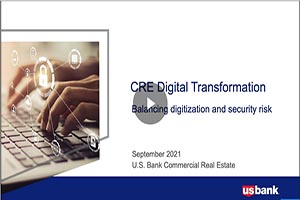
Crack the Swift code for sending international wires

ABL mythbusters: The truth about asset-based lending

Easing complex transactions: Project finance case studies

Easier onboarding: What to look for in an administrator

The reciprocal benefits of a custodial partnership: A case study

What is CSDR, and how will you be affected?

Avoiding the pitfalls of warehouse lending

Automate escheatment for accounts payable to save time and money

Ways prepaid cards disburse government funds to the unbanked

Optimizing treasury management

Why Bond Issuers Should Consider a Successor Trustee

Automating healthcare revenue cycle

Changes in credit reporting and what it means for homebuyers

Look to your custodian in times of change

Tapping into indirect compensation to recruit foreign talent

Why other lenders may be reaching out to your employees

How institutional investors can meet demand for ESG investing

Sustainability + mobility: Trends and practical considerations

CRE trends

A checklist for starting a mobility program review

Mortgage buydowns and subsidies in today’s talent-focused relocation policies

Managing complex transactions: what your corporate trustee should be doing

High-cost housing and down payment options in relocation

Why retail merchandise returns will be a differentiator in 2022

Digital processes streamline M&A transactions

4 benefits of independent loan agents

Save time with mobile apps for business finances

At your service: outsourcing loan agency work

Middle-market direct lending: Obstacles and opportunities

How RIAs can embrace technology to enhance personal touch

Best practices for optimizing the tech lifecycle

What corporate treasurers need to know about Virtual Account Management

Work flexibility crucial as municipalities return to office

An asset manager’s secret to saving time and money

Overcoming the 3 key challenges of a lump sum relocation program

Treasury management innovations earn Model Bank awards

Crypto + Relo: Mobility industry impacts

For today's relocating home buyers, time and money are everything

Webinar: CRE Digital Transformation – Balancing Digitization with cybersecurity risk

Technology strategies to complement your business plan

